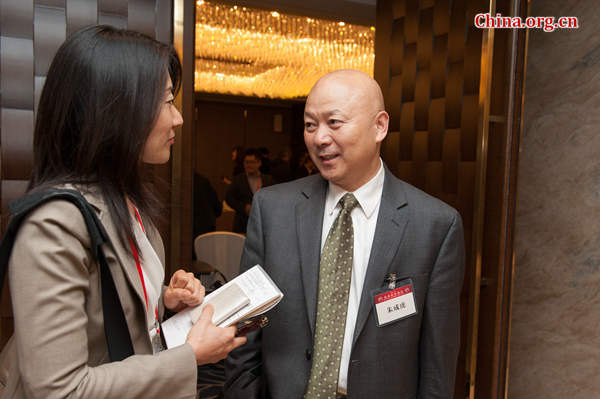'Miscalculations' result in China-Japan mistrust: Maj-Gen
- By Chen Boyuan
 0 Comment(s)
0 Comment(s) Print
Print E-mail China.org.cn, October 26, 2015
E-mail China.org.cn, October 26, 2015
 |
|
Major General Zhu Chenghu answers a reporter's question at the 11th Beijing-Tokyo Forum on Oct. 25, 2015. [Photo by Chen Boyuan / China.org.cn] |
The lingering tensions in China-Japan relations are felt primarily in the security field, where no practical bilateral cooperation has yet been established due to deep bilateral mistrust. Zhu Chenghu, a major-general teaching at the PLA National Defense University has said that "bilateral miscalculations" are one reason for such mistrust.
The Chinese public is under the impression that Japan is seeking to restore its wartime militarism, evident in its military revival. In May this year, The Japan Maritime Self-Defense Force (JMSDF) commissioned the JS Izumo helicopter carrier, whose full-load displacement reaches 27,000 tons. The Japanese have categorized the vessel as a "frigate," an apparent bid to bypass the restriction on the SDF to possess large vessels. Last month, the newly passed military legislation has allowed Japan's military to operate overseas on behalf of the "collective self-defense" of its allies.
Such recent moves conducted by the Abe Administration have been widely interpreted by China as well as other neighboring countries in Asia as "rising militarism," but Maj-Gen Zhu, trying to ease such concerns, said at the 11th Beijing-Tokyo Forum held in Beijing on Saturday that "militarism" was, at the very least, not the right word to describe the situation.
"The Japanese military budget was only one percent of its 2014 GDP, which stood at 4.98 trillion yen (US$42 billion). We don't regard that as militarism as Japan should at least sustain its 'militarism' with figures. Japan hasn't conducted any national mobilization, and its industries are mostly for civilian products," said Maj-Gen Zhu.
Similarly, China is concerned that Japan would embark on its WWII military path and that the country's military deployments have entirely targeted China. In recent years, Japan has closely followed the United States and other countries in opposing every single move of the PLA. There were even Japanese scholars suggesting Japan tag along when the United States threatened to enter the 12-nautical miles' range surrounding Chinese reefs in the South China Sea.
He said it is understandable why Chinese people are prone to think of Japan in this way as the concept of "once bitten, twice shy" is rooted in Chinese culture. However, this mentality alone should not sustain such a belief.
At the same time, the general said there has not been a major media discussion on how to deal with the U.S. threat to violate Chinese maritime territory in the South China Sea and that the PLA's response would be based on the actions of America's Navy and Air Force.
According to him, China and the United States are in dispute over the interpretation of 'innocent passage,' and whether the UN stipulation also applies to military vessels. "But a consensus is that your vessels must maintain the same speed and continuously pass through our waters; you cannot halt your vessels, or it is not innocent passage," said Zhu.
At the same time, Japan's miscalculations of China are also "everywhere." Japanese people tend to think that China is engaging in military expansion, China's rising defense budget is aimed at Japan, and that China intends to resolve issues surrounding the Diaoyu Islands and South China Sea by force.
"Japan's total defense budget over the past 40 years is far higher than China's. Now that you have the Japan-U.S. Security Treaty, it's reasonable for us to think that you would stand with the United States if a war were to break out between China and the United States," said Zhu. "Under such circumstances, you lash out against China's defense modernization and even take it personally. It is just a miscalculation."
Former Japanese ambassador to China Yuji Miyamoto has echoed positively with Zhu's notions, saying the problem is that neither side understands how the other is thinking. "Instead, I urge both countries to assume an honest attitude and brief each other when such miscalculations happen again.This is what we should do," said Miyamoto.
Kazuhiko Togo, professor at Kyoto Sangyo University, explained also at the Beijing-Tokyo Forum that Japan's recent uncapping of "collective defense" rights was to make the U.S.-Japan Security Treaty "symmetrical" and therefore "normal." He also said that lifting the restriction legitimizes Japan's effort to help its allies and beyond, including, for example, China's overseas soldiers who wear the UN blue helmets.
Both the Japanese government and people wish to have a "normal country" 70 years after the war ended, and it is as understandable as China's concern that Japan would repeat is militarist history.
While many Japanese politicians have said that Japan would not seek military hegemony, China is expecting Japan to find a way to start benign interactions on security issues, a way that is different than tagging along with the United States and interacting only by means of confrontation.






Go to Forum >>0 Comment(s)